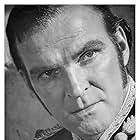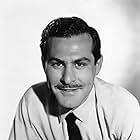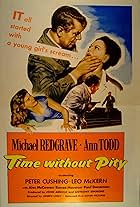IMDb RATING
6.8/10
1.8K
YOUR RATING
In the UK, after pulling a racetrack robbery, repeat offender Johnny Bannion hides the loot in a farmer's field but the police and the local mob come looking for Johnny and the money.In the UK, after pulling a racetrack robbery, repeat offender Johnny Bannion hides the loot in a farmer's field but the police and the local mob come looking for Johnny and the money.In the UK, after pulling a racetrack robbery, repeat offender Johnny Bannion hides the loot in a farmer's field but the police and the local mob come looking for Johnny and the money.
Kenneth J. Warren
- Clobber
- (as Kenneth Warren)
- Director
- Writers
- All cast & crew
- Production, box office & more at IMDbPro
Storyline
Did you know
- TriviaThe racecourse that Stanley Baker robs is Hurst Park. It opened in 1890 and closed in October 1962.
- GoofsAfter Johnny kicks the partygoers out of his apartment, he starts to run a bath then gets out a sun ray lamp, lies on his bed and is about to switch the lamp on when he discovers Suzanne in the bed. There is no scene showing him turning the bath taps off or showing the bath overflowing.
- Quotes
Mike Carter: I'm afraid things have changed a bit.
Johnny Bannion: How much?
Mike Carter: Double, twenty percent.
Johnny Bannion: You've got some explaining to do, haven't you?
- Alternate versionsAnchor Bay's DVD, whilst otherwise uncut, does not include the melancholy end credit sequence, played over shots of circles of prisoners in the exercise yard.
- SoundtracksPrison Ballad (Thieving Boy)
Music by John Dankworth (uncredited)
Lyrics by Alun Owen (uncredited)
Sung by Cleo Laine
Featured review
The Criminal (AKA: The Concrete Jungle) is directed by Joseph Losey and written by Alun Owen. It stars Stanley Baker, Sam Wanamaker, Margrit Saad, Patrick Magee, Grégoire Aslan, Rupert Davies and Laurence Naismith. Music is by John Dankworth and cinematography by Robert Krasker.
Johnny Bannion (Baker) is an ex-con who's taken part in the robbery of a racetrack but is caught and sent back to prison; but not before he has time to bury the cash from the gig. Back in prison Johnny is keeping the cards close to his chest but finds there are big crime forces wanting a piece of his action. With plans afoot to "twist" his arm, and his girlfriend kidnapped, Johnny knows something is going to have to give...
All my sadness and all my joy, comes from loving a thieving boy.
Once tagged as being "The toughest picture ever made in Britain", The Criminal obviously seems tame by today's increasingly over the top standards. Yet it still packs quite a punch and shows the very best of Messrs Losey, Baker and Krasker.
In some ways it's a strange film, the pace is purposely slow and the narrative is bolstered by bouts of hang wringing tension, where periods of calm come laced with a grim oppressive atmosphere, but there's often electricity bristling in the air when Bannion (Baker is magnetic and brilliant as he apparently models the character on Albert Dimes) is holding court. Even when on the outside and feeling the love of a good woman, Bannion exudes a loner like danger, he's tough but being a hard bastard can't break him free from the shackles of his life. We know it and you sense that he himself knows it, and it gives the film an exciting edge not befitting the downbeat tone of the story. Characters here have not been delivered from happy land, you will struggle to find someone here who isn't nasty of heart, bad in the head or simply foolish. Inside this concrete jungle it's a multi cultural hive of emotional disintegration, and at the core stirring the honey pot is one Johnny Bannion. The film makers here are all about pessimism, self-destruction and the battle against the system and the underworld, right up to (and including) a finale fit to grace the best noirs of the 40s.
Losey and Krasker ensure the prison sequences are stifling, the walls close in, the bars and netting are unsettling and close ups of the odd ball assortment of crims and warders strike an incarcerated chord, visually it's an impressive piece of noirish film. But it's not just about shadows and filtered light, the director has skills aplenty with his camera. A kaleidoscope shot has a delightfully off kilter kink to it, while his overhead filming and pull away crane usage for the frosty cold finale is as memorable as it is skillful in selection. Musically the pic begins and ends with the soulful warbling of Cleo Laine, the tune is a Prison Ballad (Thieving Boy), and it's tonally perfect, while Dankworth and his orchestra provide jazz shards that thrust in and out of the story like knowing accomplices to fate unfolding. Set design is superb, especially for the recreation of a Victorian prison which is impressive and makes it easy to not lament an actual prison location used, while the supporting actors are very strong, particularly Magee (Zulu) who excels doing sneaky menace as Warder Barrows.
Flaws? Not any if you don't actually expect the toughest film made in Britain back in the day (though it was banned in some countries!). I do wonder why Baker had to be an Irish character and not just be Welsh and therefore do his natural Welsh accent? And if we are are being over critical we could suggest there are some prison stereotypes that even by 1960 were looking frayed around the edges. But ultimately this is tough stuff, a gritty and moody piece of cinema with class on either side of the camera. 8/10
Johnny Bannion (Baker) is an ex-con who's taken part in the robbery of a racetrack but is caught and sent back to prison; but not before he has time to bury the cash from the gig. Back in prison Johnny is keeping the cards close to his chest but finds there are big crime forces wanting a piece of his action. With plans afoot to "twist" his arm, and his girlfriend kidnapped, Johnny knows something is going to have to give...
All my sadness and all my joy, comes from loving a thieving boy.
Once tagged as being "The toughest picture ever made in Britain", The Criminal obviously seems tame by today's increasingly over the top standards. Yet it still packs quite a punch and shows the very best of Messrs Losey, Baker and Krasker.
In some ways it's a strange film, the pace is purposely slow and the narrative is bolstered by bouts of hang wringing tension, where periods of calm come laced with a grim oppressive atmosphere, but there's often electricity bristling in the air when Bannion (Baker is magnetic and brilliant as he apparently models the character on Albert Dimes) is holding court. Even when on the outside and feeling the love of a good woman, Bannion exudes a loner like danger, he's tough but being a hard bastard can't break him free from the shackles of his life. We know it and you sense that he himself knows it, and it gives the film an exciting edge not befitting the downbeat tone of the story. Characters here have not been delivered from happy land, you will struggle to find someone here who isn't nasty of heart, bad in the head or simply foolish. Inside this concrete jungle it's a multi cultural hive of emotional disintegration, and at the core stirring the honey pot is one Johnny Bannion. The film makers here are all about pessimism, self-destruction and the battle against the system and the underworld, right up to (and including) a finale fit to grace the best noirs of the 40s.
Losey and Krasker ensure the prison sequences are stifling, the walls close in, the bars and netting are unsettling and close ups of the odd ball assortment of crims and warders strike an incarcerated chord, visually it's an impressive piece of noirish film. But it's not just about shadows and filtered light, the director has skills aplenty with his camera. A kaleidoscope shot has a delightfully off kilter kink to it, while his overhead filming and pull away crane usage for the frosty cold finale is as memorable as it is skillful in selection. Musically the pic begins and ends with the soulful warbling of Cleo Laine, the tune is a Prison Ballad (Thieving Boy), and it's tonally perfect, while Dankworth and his orchestra provide jazz shards that thrust in and out of the story like knowing accomplices to fate unfolding. Set design is superb, especially for the recreation of a Victorian prison which is impressive and makes it easy to not lament an actual prison location used, while the supporting actors are very strong, particularly Magee (Zulu) who excels doing sneaky menace as Warder Barrows.
Flaws? Not any if you don't actually expect the toughest film made in Britain back in the day (though it was banned in some countries!). I do wonder why Baker had to be an Irish character and not just be Welsh and therefore do his natural Welsh accent? And if we are are being over critical we could suggest there are some prison stereotypes that even by 1960 were looking frayed around the edges. But ultimately this is tough stuff, a gritty and moody piece of cinema with class on either side of the camera. 8/10
- hitchcockthelegend
- Dec 11, 2012
- Permalink
- How long is The Concrete Jungle?Powered by Alexa
Details
Box office
- Budget
- $200,000 (estimated)
- Runtime1 hour 26 minutes
- Color
- Aspect ratio
- 1.66 : 1
Contribute to this page
Suggest an edit or add missing content


































